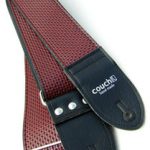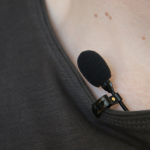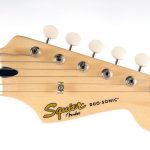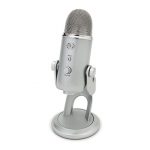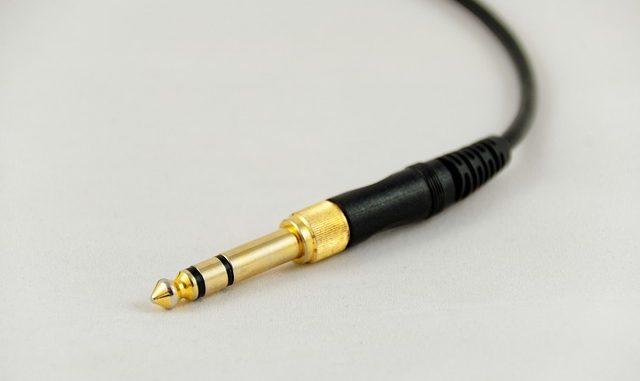
When you buy a guitar, the chances are you want to focus on the glamorous side of things! The exciting stuff to spend money on is the guitar, the effects pedals and other cool accessories. The best guitar cables may not be at the top of your list, but they should be! Using a great guitar with a substandard cable is a bit like buying a top of the range car, filling it with the wrong gas and sticking some bricks in the trunk. A bad guitar cable will restrict what your guitar can do, a good cable won’t, and may even help to enhance the sound. Is it a glamorous product? Maybe not, but it sure is an important one.
If you go into a guitar store and start asking too many questions about cables, the chances are the clerk will run out of knowledge. Some people can go through a lifetime of playing guitar, become absolute maestros, and never really understand how the guitar is working, and the role the guitar cable has on the sound. As with a lot of electronics and electronic related products, the terminology can be confusing, and it feels a bit ‘science-y’ which is not something most of us start playing guitar for. In truth, you don’t have to have a huge amount of knowledge on cables to work out what is best for you.
As always, here at Subreel we’re happy to do the research up front, and have a load of guitar cable reviews, as well as a look at the criteria for what even makes a good cable, and whether it will suit you and your style of playing.
You Get What You Pay For?
This is actually an age old debate. “The $3 cable is just as good” is an opinion some guitarists hold. Now, don’t get me wrong, if you’re just starting out and have bought your first guitar, the most expensive cable is probably overkill, but the cheapest guitar cable will probably cause more problems than it gives solutions. The science behind whether it is worth paying more for a top of the range cable is pretty simple, but that won’t stop people trying to tell you that their $3 bargain bin cable is as good.
Why is it that some microphones sell for $10, and some sell for $10,000? Well, myriad factors including design and even branding, but one of the main reasons is the build quality. This is something that is key in almost every audio product. In the world of audio, this is important for two reasons:
- You don’t want it to break or be unreliable. This is obvious, you don’t want the jack coming loose, the cable breaking or the inconvenience of it just deciding not to work when you’re about to play a gig.
- It has to carry audio signal. Audio is something that can’t be recovered. Everything it is carried through has the opportunity to weaken it in some way, your guitar, the cable, the amp, the microphone… Just one broken link in the audio chain ruins everything, and spending a fortune on an amp and guitar whilst skimping on the cables is madness.
Price isn’t always the only indicator of quality, and I’m sure some $3 cables are a lot better than others, but spending next to nothing is unlikely to get the quality you need. At the higher end of the market, the ‘you get what you pay for’ theory doesn’t always add up either as some cables offer better value for money, but generally speaking, more dollar = better cables.
What to Look For in an Guitar Cable
So we’ve explained the merits of having a good guitar cable, now it is time to work out what even constitutes a good one. If you’re new to the world of audio, this can be tough to navigate, but a few simple criteria will generally help you finding one. Plus, we have some guitar cable reviews below for you to see our specific recommendations.
- Shielding – this is designed to protect the cable and avoid interference from any other audio signals or electronics, such as the stage lighting or even local radio. It stops the signals from affecting the conductor which is where the audio signal is carried, and if you don’t have good shielding, you can end up with annoying hums, noise or interference on the audio track.
- Cable Length – seems like it should be the most obvious choice of all when working out which guitar lead to buy, but it really isn’t. Tests have proven that the length of a cable can lead to the audio signal degrading. Buying a 30 meter cable is great for playing huge stages and festivals, but is probably overkill for a home studio. You need to find a happy middle ground between long enough so that it isn’t restrictive to your playing or gigging, but short enough that the audio quality isn’t going to start to decrease. If you have a home setup where you normally play, working out the length of cable isn’t too tough, and honestly, it is better to go a little too long than go for too short and not have any freedom to move.
- Jack Connectors – the connectors which plug into your guitar and then into your amp or interface are usually referred to as jack connectors, end connectors, even 1/4 inch jacks. These need to be durable and not something that is going to break, they take a lot of strain when a guitar gets yanked around and on the poorer models of cable can come loose from the cable itself or even start to wear and be unable to stay in place, leading to the audio signal breaking up.
- Durability and Reliability. Certain models and even brands of guitar cable are a lot better at offering a durable and reliable solution. Something where the wires don’t get exposed, and things don’t start to break on you after a couple of uses. This is something you need to look at product by product, and other people’s guitar cable reviews are a great help.
The Genre Myth and Multiple Instruments
This is definitely worth mentioning and considering before you choose which cable to buy. Some people, reviewers and even manufacturers will revel in telling you that theirs is the best guitar cable for metal or for jazz or the best cable for rock music. This isn’t true. Whilst they may have a very good cable that they’re very happy with, they don’t affect the style of the sound, just the quality. Don’t worry about which genre or style of music you’re playing here, we’re just looking for functional and value for money.
Just the same as genres, instruments won’t really play a part either. A jack to jack cable is required for a lot of different instruments, and can be used not only for guitars but mandolins, electric violins, electric pianos, bass guitars and more. A good cable is a good cable, and instruments don’t have specific leads.
VOX VCC090RD
We’re into the list with an offering from Vox. They’re an amazing manufacturer of audio products and their range of amplifiers is nothing short of iconic. The VCC090RD cable is eye-catching. Lets face it, it looks very cool, and is even available in a multitude of colors, but looks aren’t everything and luckily it does the Vox brand name proud, offering excellent quality and audio isolation, meaning interference isn’t a worry. The features include:
- High quality 99.99% purity oxygen free copper cable conductors
- Two shields to isolate from interference whilst most cables have one.
- Gold plated, corrosion resistant connectors with exceptional conductivity.
- High temperature PVC casing that is durable and very unlikely to wear quickly.
This is heavy gauge and in spite of looking like it may belong in the 60s, the quality and technology used to produce it are definitely 21st century. The curly cable look is awesome, the cable itself is very long and durable and a look at some other reviews on Amazon or elsewhere is likely to show you a lot of positive Vox VCC090RD reviews. The sound quality is top drawer, and whilst this may not be the cheapest guitar cable, the quality is definitely there.
Bonus; because of its coiled design, after stretching out during use it pretty much coils itself back up, no more wasted hours wrapping the guitar lead up after a gig or practice.
Planet Waves American Stage Guitar and Instrument Cable
Planet Waves perhaps aren’t as iconic a brand as some of the others on this ‘best of’ list, but they certainly hold their own in the world of instrument cables, and for those looking for the best value for money, their American Stage Guitar Cable is an amazing offering that just might win the day if you’re trying to find something that balances quality with being kind to your purse.
Most hobby guitar players are looking for the reliability of a top model without having to spend a fortune, and the amazing reviews that this product has received online show that a lot of people have found their winning combination with Planet Waves.
The guitar cables come in 10, 15, 20 and 30 ft lengths, and you can choose between the straight ends or right angled ends. The plugs they have used are ‘Neutrik’ which is not something a lot of the cheaper competitors have used. The Geo-Tip is designed to click as it goes into the jack slot, so you know you’re properly connected.
As well as having a load of positive reviews, and users reporting successfully keeping these cables for years with no problems, the Planet Waves cables come with a warranty to ensure if anything happens just after buying, you can get yourself a replacement. The cables are inexpensive and amazing for guitar or other instruments which require a jack connection. As you would expect, the price goes up a bit if you want one of the longer models of Planet Waves cable, but you’re unlikely to find Neutrik jacks at this price elsewhere.
Fender Custom Shop Performance Series Cable
It wouldn’t be a guitar ‘best of’ list without a Fender product making the cut. Fender have a huge range of products and offer everything from budget, beginner products to high end professional products. This is definitely a professional product, and has been used by some big names.
Those who have bought this cable seem to largely be very happy with it. One of the real positives of this product is the fact that it has excellent isolation due to the braided jacket and avoids any noise and interference, but where this can really win the day is over distance. The longer, 25 foot models don’t really degrade, and so many people have reported this as being one of the best long guitar cables they’ve come across. This is available in many different sizes, 5 foot, 6 foot, 10 foot, 15 foot, 18.6 foot, 20 foot and 25 foot, so having so much choice can ensure you get something perfect for your own needs.
Mogami Gold Instrument 10 Guitar/Instrument Cable
Though this may not be an option for those of us on a budget, this is an exceptional cable that we had to mention on our list. Mogami make a silver, gold and platinum model and the price goes up just as you would expect. If you want five star then the Mogami range is one you should consider. We’ve put the gold on the list as it still has some amazing features without costing the same as the platinum, making it a bit more of an affordable option.
Mogami aren’t a ‘jack of all trades’ audio manufacturer. Cables are very much their thing, be that studio cables or in this case, instrument cables. Their specialism in the area ensures the very best.
The manufacturer boasts absolutely silent audio handling, meaning no interference whatsoever, the reviews from consumers and online retailers discuss just how great this product is in terms of reliability, and this is backed up by the manufacturer currently offering a truly amazing lifetime guarantee. This durable, hard-wearing, zero interference guitar cable is extremely hard to find fault with. If you’re willing to pay a little extra for the pro quality, look no further than the Mogami Gold.
Conclusion
So as we explained right from the outset, this isn’t the most exciting of subjects, and most guitarists don’t get a thrill out of buying them, but the annoyance of having cables which break will outweigh spending a bit of time finding the best. Truth be told, flimsy cables will likely cost more in the long run as they break and cost money to replace. A $50 cable that lasts five years is better than having to buy a $10 cable every three months, and whilst there are cables available under $20 that may do a decent job, spending a little more for something reliable and quality is worth it in the long run if you plan to take your guitar playing seriously.

